In this post I drew attention to a Coptic encomium on the twelve apostles, attributed to Severian of Gabala (CPG 4281; clavis coptica 0331). Sever Voicu published, in the journal Apocrypha, an extensive and well-documented article concerning the apocryphal traditions related to the apostles, which appear in the encomium of Ps-Severian.[1]
The encomium on the twelve apostles is known to survive in the Sahidic dialect of Coptic (Recension A) and in Arabic (Recension B). The Arabic recension, preserved in two manuscripts, one in the Vatican and the other in the Coptic Museum in Cairo, is radically different from the Coptic version. The latter was edited and translated into English by Michael E. Foat after a Sahidic manuscript from the Monastery of the Archangel Michael, situated near Hamouli, in the Fayyum oasis.[2] In 2005, Davide Righi published a fresh edition of the Hamouli manuscript together with the editio princeps of the two Arabic manuscript witnesses.[3]
In my previous post on Ps-Severian’s Encomium on the Twelve Apostles I pointed out that there is another manuscript of the Coptic recension (Recension A), from which only a few scattered leaves have survived. You may check there the directory of the fragments that I have identified until now.
Further research on different collections of Coptic manuscripts revealed other fragments of the same encomium. The most interesting thing about these new fragments is that they contain the recension of the encomium on the apostles which has been known until now only in Arabic (Recension B). This clearly shows that the Arabic version is not a late reworking of the Sahidic, but it rather goes back to a Coptic original.
Until now, I have been able to find vestiges of two Sahidic codices containing the text of Recension B. From the best preserved manuscript (Codex A) I have spotted seven leaves, while from the second (Codex B) only four badly damaged fragments.
When flipping through Walter E. Crum’s catalogue of the Coptic manuscripts in the British Museum (today in the British Library), I was surprised to discover that under his unidentified “no. 912” are hiding in fact four consecutive leaves from a Bohairic parchment manuscript of Ps-Severian’s encomium on the apostles.[4] They also come from the Recension B, which is therefore attested now in Sahidic, Bohairic and Arabic. As I did not possess photographs of the British Library Bohairic fragments, Dr. Karlheinz Schüssler from Vienna was kind enough to send me copies of the material. Thus, I am able to judge now on the basis of many Sahidic features in the Bohairic text, that the latter version is based on the former. As to the Arabic version, I think we can be confident that it was translated from Bohairic.
I guess these notes are quite uninteresting for many readers of this blog, but I wanted to show why it is important to work with manuscripts when we approach ancient texts. This is especially true for Coptic literature, which is still little explored. As Enzo Lucchesi has pointed out many times, when properly investigated, any Coptic fragment can bring to light unexpected things.
I am currently preparing an edition of the Sahidic and Bohairic fragments of the Recension B of Ps-Severian of Gabala’s encomium on the twelve apostles. In this sense, I am sharing here a draft version of my translation of the new Sahidic fragments, to give a glimpse of the text’s flavor.
TRANSLATION:
Pseudo-Severian of Gabala,On the Apostles (CPG 4281; clavis coptica 0331)
Four leaves missing
(p. 9) […] they followed him.
Behold this wonder! After following him, he did not immediately give them power to perform miracles, nor did he reveal to them the ineffable mysteries, so that their heart shall be strengthened and they may follow him. But rather he spoke to them with harsh words, commanding them the rules of life. […] […] […] “[…] [an] enmity with your brother, leave your gift until you go first and reconcile with your brother. If you see a woman, do not lust after her. If your eye offends you, pluck it out and cast it away from you. Do not swear on anything […] all […] [Do not] swear […] (p. 10) Let your word be yes, yes and no, no. He who will strike your cheek, turn him the other one and you will be saved. And he who will want to do you wrong, leave him to God. The one who will want to take your tunic, leave [him] your [garment also]. [The one who will compel] you [(to go) a mile, go with him two] […] […] […] openly for the glory of men. Do not give alms openly. Do not fast like hypocrites. Do not worry about tomorrow. Do not judge so that you shall not be judged, do not condemn so that you shall not be condemned, so that they shall forgive you […] […] […].
Four leaves missing
(p. 19) […] [I will] fill them for you. Then what are you wishing further? If you want the reward for the fishing-net, I will give it to you. Amen, I say to you, you will eat and drink with me at the table of my kingdom. You have left behind parents that are dying, I will teach you about my Father which is in heaven and I will call you his sons. You have left behind earthly brothers, I will call you ‘my brothers.’ You have left behind heirs, I will be your heir. You have left behind children, my angels will serve you. You have left behind gardens and vineyards, I will give you the Paradise. You have left behind fishing-nets that are perishing with time, I, for my part, will give you the Church that does not perish nor grows old because I have built it (p. 20) on the firm rock, this being myself. In place of the nets that draw fish from the water, I will give you the proclamation of my Gospel, the one that draws men from death to eternal life. Behold, I have given you these for the things that you have left behind.”
After all these, the mother of the sons of Zebedee told him: “Teacher, say that my two sons may sit one on your right and one on your left in your kingdom.” O, this amazing demand, O, my beloved! From where to where? From rowing with the oar until they become assistants of the Son of God, from throwing the net after fish until they sit with Jesus in his glory. And he called them friends. For he said to them: “You are my friends,” “all those that I have heard (p. 21) from my Father I showed them to you,” and also: “I am the true vine, you are the branches, (and) my Father is the farmer.”
You have seen that these men were so exalted that the Son of God told them “You are from me.” Like the branch(es) of the vine that are cut from it, planted everywhere and they bring forth fruits, likewise the apostles have been taken out from the words of Christ and planted in the entire inhabited world.
And the Savior said these things to the twelve while Judas was still with them. He told them: “Behold, I will send to you the Paraclete, the Spirit of truth. Behold, I will go up to my Father, that is your Father, and to my God, that is your God.”
He was the one who knew the heart of everybody. And when he knew the disposition of each one’s heart, he gave him according to his merits. (p. 22) When he saw Peter’s innocence and that he is forgiving, he promised him saying: “I will give you the keys of the kingdom of heaven to take care of it,” and “that which shall bind on earth shall be bound in heaven, and that which shall loose on earth shall be loosen in heaven.” If Peter would not be forgiving, no one would be able to enter the kingdom of heaven. He instructed Andrew: “There are many rooms in my Father’s house.” To James he showed his glory on the mountain. He allowed John to stick to him because of his purity and virginity. He taught Philip: “I am in my Father and my Father is in me.” He taught Thomas: “I am the way which leads to life.” (He said to) Matthew: “I am the light of the world.” (He said to) Thaddeus: “I am the (p. 23) shepherd who will give his soul for his sheep.” (He said to) Simon: “The one who has seen me has seen my Father.” (He said to) James the son of Alpheus: “I am the spring of life.” (He said to) Bartholomew: “I am the bread of life.” To Judas, knowing that he is a thief, he put the money case into his hand not to find pretext to say (some words seem to be missing here).
As he sees everything and knows the purity and the disposition of the heart of each one of them, thus he saw also the purity of John’s heart (and) he let him stick to him as his beloved. For (the evangelist) said: “Jesus loved him.” Then, knowing the heart of that traitor whose name is not worthy to be pronounced, he gave him according to his merit. And he said while there was a supper: “One of you will hand me over.” While they were all telling him: “By no means it is me, Lord,” Peter made a sign to John because (p. 24) he was reclining on the bosom of Jesus as a little child reclines on the bosom of his father. He told him: “Ask him who is it.” “Then the one who cast himself on the bosom of Jesus asked him” said (the evangelist).
O, this great wonder! O this perfect invaluable gift! A man of flesh born of woman has reclined on the bosom of God! O hand of bone and flesh is reclined on the bosom of Jesus. A tongue of flesh is speaking to God mouth to mouth. The one whom he created is reclining on his bosom.
O, this great gift! Which human mind, even if it is beautiful like that of Solomon, will be able to imagine or to proclaim the honor of these men?
From “the son of Zebedee the fisherman” to “the beloved of God.”
From “the brother of James” to “the beloved of Jesus.”
From the place of rowing with the oar until he reclined himself in the bosom of Jesus.
From the pieces of wood on which he was resting until (p. 25) he rested on the bosom of God.
And after they crucified him and he rose from the dead, he appeared first to Simon. Afterwards he spoke to Mary: “Go, say to my brothers that I will go up to my Father that is your Father and my God that is your God.” He ceased to call them “brothers and companions” (and) he called them “brothers and sons of God.” For when he went up to his Father, he sent upon them the Holy Spirit (and) they endured every suffering: they struck them, wounded them, lapidated them, threw them into the sea, crucified them, flayed their skin from them, cut their head, but with all these they were not able to separate them from the love of God. He granted them honors on the earth and also in heaven.
If you want to know the truth, listen. Peter came passing by with John. He saw a crippled man that (p. 26) was looking at them. They said to him: “Look at us.” Then they said: “We do not have gold nor silver, but what we have we shall give you. In the name of Jesus the Nazarene, walk!” He said: “They put the sick into the streets so that while Peter will come, walking his shadow would fall upon them and they will cure.” He also said: “They have brought the sick and those who were afflicted by the unclean spirits and they were healing all of them.” It is true the word which our Savior told them: “You are my friends,” because they have been truly worthy of admiration. For just as a tree burdened with fruits, while its sweet fruit is taken from it to be planted everywhere, it (still) resembles it, so too is Christ here (in this world); the tree of life that was planted in his disciples to master over the diseases and unclean spirits still resemble him in form.
Four leaves missing, but much of the text is recoverable in the Bohairic fragments
(p. 35) […] without these stones, similarly, the priesthood is not fulfilled without its canons. For which is the church in the whole world in which you will not find the name of these twelve apostles and their living teachings? If you want to know that the church shall not be complete without them, listen and I will inform you.
Moses was commanded to build an altar to the Lord. He took twelve sound stones that were perfect (and) he built with them an altar of burnt-offering to the Lord. And Elijah has also built the altar from these twelve stones. And he took as well four pitchers of water (and) he poured them on the burnt-offering. He repeated again (and) he poured (water) three times until the number of pitchers arrived to twelve, according to the number of the twelve apostles. The twelve stones from which the altar is made are also the twelve apostles, (p. 36) those from which all churches in the entire world are built. The four pitchers of water that he has poured on the burnt-offering are the four gospels. For just as the burnt-offering upon which Elijah has poured the water so that nobody could think that a foreign fire is hiding in the altar, in the same way are the gospels that (the apostles) have preached in the whole world: they proclaimed Jesus and (that) they crucified him, speared him with a lance, put a crown of thorns upon him, gave him to drink vinegar and gall, put him in a tomb, so that no one among those who like to quarrel could say that they are honoring him very much but are not proclaiming his sufferings. For the interpretation of the four pitchers is the four gospels (and) the three times that the water was filled (and) emptied is the type of the Holy Trinity.
For just as Elijah built (p. 37) with those stones, pilled the wood on the stones and poured water on the wood, stones and burnt-offering so that the fire came down from heaven and it devoured the wood, the stones, the sacrifice and the water, this is also the way of every place which has in it the names of these twelve apostles, these being the stones that build the soul, the wood, which is their words, those four [pitchers], which [are] the four gospels, [and the water] that was poured on the burnt-offering, which is the water of the holy baptism. Then, it shall also be found (there) the perfect calf that was immolated for our salvation and cleansing, this being the body and blood of the Lord Jesus Christ. And it shall also be found the fire of the Holy Spirit burning in their heart.
Therefore, every man that receives the belief of the holy apostles, listens to their words, purifies himself through (p. 38) the water of baptism, and takes from the holy body and blood of the Lord, the Holy Spirit descends upon him, dwells inside him and destroys the pagan mind inside him. For this reason it was not written that the water was poured on the burnt-offering to wash it, but (the Scripture) said that he poured the water around the altar, signifying through this that it is not possible for man to stay around the altar except (being purified) through the water of the holy baptism, the one about which the Savior commended to his disciples saying: “Go and baptize all the nations in the name of the Father, of the Son, and of the Holy Spirit.” These are also the three times that Elijah poured water on the altar.
So was your heart satisfied, O the one who speaks against, that […]
Unknown number of leaves missing
[1] S. J. Voicu, “Pseudo Severiano di Gabala, Encomium in XII Apostolos (CPG 4281): Gli spunti apocrifi,” Apocrypha 19 (2008) 217-266.
[2] L. Depuydt, Encomiastica from the Pierpont Morgan Library 2 vols. (CSCO, 544 & 545. Scriptores coptici, 47 & 48; Louvain: Peeters, 1993) 1: 85-130 (Coptic text), 2: 65-101 (English translation).
[3] D. Righi, Severiano di Gabala, In apostolos: Clavis Coptica 0331 (CPG 4281) 2 vols. (Rome: C.I.M., 2004).












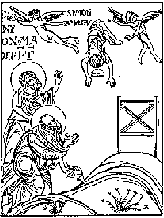




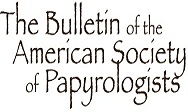
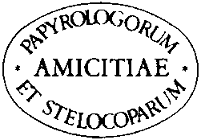
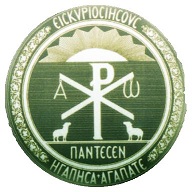





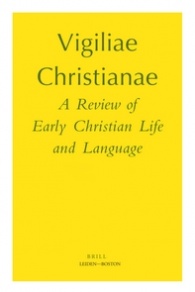






Pingback: Where to find the “Clavis Coptica” at Roger Pearse